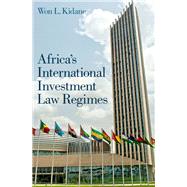Africa's International Investment Law Regimes
, by Kidane, Won L.- ISBN: 9780197745571 | 0197745571
- Cover: Hardcover
- Copyright: 11/17/2023
Over the last six decades, Africa has attracted less than 4% of global foreign direct investment, and yet is party to nearly a quarter of the world's investment cases under the International Centre for Settlement of Investment Disputes (ICSID). The African states' support was indispensable for the creation of the ICSID, but once it began its adjudicative function it became a source of dread for Africans. Since the beginning of the new millennium, however, Africa has embarked on innovative reform efforts and questioned the shortcomings of international investment law.
Africa's International Investment Law Regimes offers a qualitative study of more than 30 cases ranging from the 1970s to present and methodically appraises Africa's investment treaty activity. In these examinations, Won L. Kidane assesses whether the adopted and proposed continental, regional, and bilateral reform efforts are indeed responsive to the actual deficiencies of the existing regime.
This book is unique in its thorough treatment of African ICSID cases. Kidane's conclusions illuminate a lack of evidence in claims of institutional bias but address the reckoning African states have undergone to become full participants in the process with proper representation. Africa's International Investments Law Regimes is an essential read for academics, practitioners, policy makers, and international stakeholders alike as these cases and reformed treaties have and will continue to shape the jurisprudence of the ICSID, the nature of international investment law, and ISDS in general.
Africa's International Investment Law Regimes offers a qualitative study of more than 30 cases ranging from the 1970s to present and methodically appraises Africa's investment treaty activity. In these examinations, Won L. Kidane assesses whether the adopted and proposed continental, regional, and bilateral reform efforts are indeed responsive to the actual deficiencies of the existing regime.
This book is unique in its thorough treatment of African ICSID cases. Kidane's conclusions illuminate a lack of evidence in claims of institutional bias but address the reckoning African states have undergone to become full participants in the process with proper representation. Africa's International Investments Law Regimes is an essential read for academics, practitioners, policy makers, and international stakeholders alike as these cases and reformed treaties have and will continue to shape the jurisprudence of the ICSID, the nature of international investment law, and ISDS in general.







